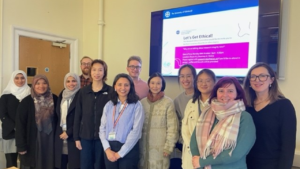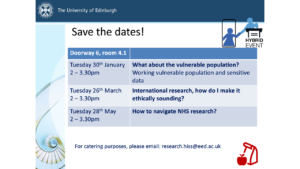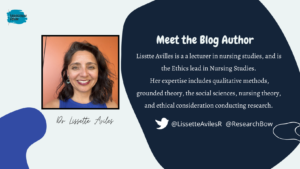The initiative involves a series of ethics workshops between staff, Postgraduate Research (PGR) Students and Early Career Researchers (ECRs) to promote a culture of research integrity across the School of Health in Social Sciences (HiSS). The series aims to engage the HiSS community in constructive conversations on ethical and integrity issues beyond the policies and procedures of ethical reviews and application processes, emphasising an in-depth reflection on research ethics in practice (Guillemin and Guillam, 2004). This is of the utmost importance when international evidence suggests that ethics education and training alone are not sufficient for fostering good research integrity; instead, strong role models and reflexivity can facilitate the consolidation of research integrity practices as core competencies for researchers (Cutris et al 2021; Hoffman et al 2020).
Promoting a culture of research integrity within PGR students and ECRs aligns with institutional and national standards (AKRIO and ARMA, 2020; The University of Edinburgh, 2022), drawing on key core principles of research integrity such as independence, competence, facilitation, and transparency and accountability (AKRIO and ARMA, 2020). The series will facilitate and promote adequate and timely support in ethical issues, critically discussing and engaging in in-depth reflection on ethics in practice. This is particularly relevant in health research, where ethical considerations and thinking are at the core of research practice. The initiative aligns with the University’s commitment to uphold the highest standards of scholarly and scientific research integrity of high-quality research conducted by our staff and students (The University of Edinburgh, 2022), contributing to benefiting the wider community.

The initiative was launched in July, funded by the InspirED scheme at HiSS. Fourteen attendees in person and online co-designed the series, including periodicity, format, and topics to be discussed in the 2023-24 academic year. Based on this work, five sessions were scheduled.
On Monday 30th November 2023, the first session started with an engaged audience, including PGR students, ECRs and staff. The first session, called ‘Why are we talking about research integrity now?’, was attended by ten people face-to-face, enjoying biscuits and coffee provided, while 28 attended online. During the session, Dr Lissette Aviles and Dr Maria Gardani, co-leads of the initiative, introduced the series and the ethics process within HiSS, revising sponsorship and the application process, followed by Q&A. The session continued with group discussions among attendees reflecting on research integrity, the importance of research integrity and strategies to ensure ethical integrity throughout the research process. At the end, attendees shared their thoughts, experiences and practices to promote research integrity as researchers.
Following the session, we invited attendees to help us with the following questions:
Why is research ethics important to you?
Elisabetta Faenza, a first year PhD candidate and PGR Rep in the School of Health in Social Science, attended the session via Teams and provided the following thoughts:
For me, thinking about and applying ethics is a foundational step in research design. Without stepping back and thinking about the ethical implications of a project, we may unconsciously or consciously reinforce power imbalances, impose our ontological position and influence the outcomes of our research. This can result in entrenching top-down epistemologies that reinforce inequality, or harm participants without truly advancing the field. As an individual with embodied, live-experience of familial child sex abuse (FCSA), I am all too aware of the potential for ethically flawed research to impact society through its application in public policy and sensationalising in the media.
What can ethical research practice offer to our research?
Dr. Zsofia K. Garai-Takacs, Lecturer in Applied Psychology and Ethics lead in Clinical Psychology, gave the following insights.
I think it helps not only making sure that you are treating your participants fairly but it also helps planning. For instance, planning how many participants you are aiming for (ideally based on a power calculation or suggestions in the literature), how you will communicate with each stakeholder, where and for how long you will store data (identifiable and non-identifiable) and about troubleshooting if anything should go wrong.
What is your top tip for ethics applications?
My top tip would be to read all materials from the perspective of a potential participant. They might even ask someone who does not know the details of the project (e.g. a fellow PhD student) to read the participant information sheet and consent form and make sure that they understand everything that participation entails, including for how long identifiable (e.g. name, contact information) and non-identifiable data will be kept about them, how and for how they can withdraw from a project etc.
——————————————————————————————————————————————————————————–
The series will continue during 2024, discussing relevant topics such as researching and collaborating with vulnerable groups and sensitive data, the challenges of international research, and engaging in research within the NHS. We are looking forward to these fascinating discussions, bringing experienced and novice researchers together to discuss ethics in practice.
Finally, if you are interested, save the date and join us!

References
Cutri, J. et al. (2021). Academic integrity at doctoral level: the influence of the imposter phenomenon and cultural differences on academic writing. International Journal for Educational Integrity, 17:8 https://doi.org/10.1007/s40979-021-00074-w
Guillemin, M. & Gillam, L (2004) Ethics, Reflexivity, and “Ethically Important Moments” in Research. Qualitative Inquiry, 10 (2), 261-280. https://doi.org/10.1177/1077800403262360
Hofmann, B. et al. (2020). Research Integrity Among PhD Students at the Faculty of Medicine: A Comparison of Three Scandinavian Universities. Journal of Empirical Research on Human Research Ethics, 15(4) 320–329. https://doi.org/10.1177/1556264620929230
UK Research Integrity Office and Association of Research Managers and Administrators (2020). Research Ethics and Review in Research Organisations. Summary Document. Available: https://doi.org/10.37672/UKRIO-2020.02-ARMA
The University of Edinburgh (2022) Edinburgh Research Office. https://www.ed.ac.uk/research-office/research-integrity




